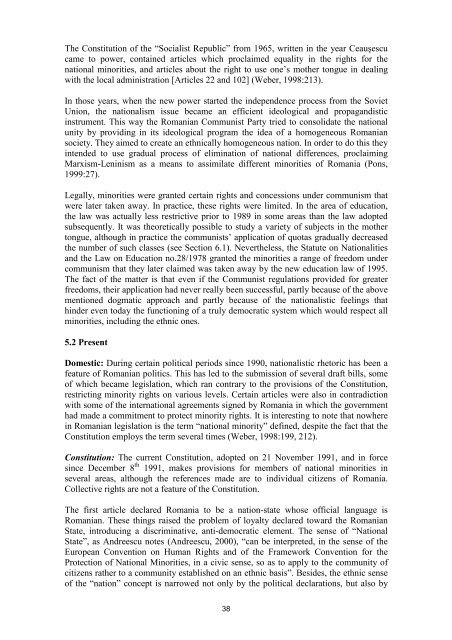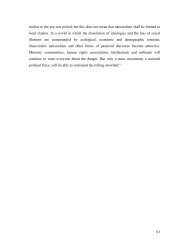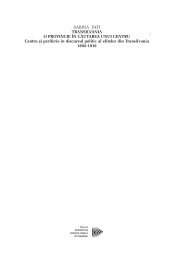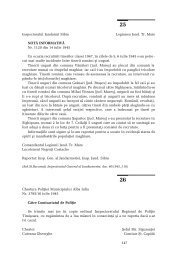Southeast Europe
Southeast Europe
Southeast Europe
Create successful ePaper yourself
Turn your PDF publications into a flip-book with our unique Google optimized e-Paper software.
The Constitution of the “Socialist Republic” from 1965, written in the year Ceauşescu<br />
came to power, contained articles which proclaimed equality in the rights for the<br />
national minorities, and articles about the right to use one’s mother tongue in dealing<br />
with the local administration [Articles 22 and 102] (Weber, 1998:213).<br />
In those years, when the new power started the independence process from the Soviet<br />
Union, the nationalism issue became an efficient ideological and propagandistic<br />
instrument. This way the Romanian Communist Party tried to consolidate the national<br />
unity by providing in its ideological program the idea of a homogeneous Romanian<br />
society. They aimed to create an ethnically homogeneous nation. In order to do this they<br />
intended to use gradual process of elimination of national differences, proclaiming<br />
Marxism-Leninism as a means to assimilate different minorities of Romania (Pons,<br />
1999:27).<br />
Legally, minorities were granted certain rights and concessions under communism that<br />
were later taken away. In practice, these rights were limited. In the area of education,<br />
the law was actually less restrictive prior to 1989 in some areas than the law adopted<br />
subsequently. It was theoretically possible to study a variety of subjects in the mother<br />
tongue, although in practice the communists’ application of quotas gradually decreased<br />
the number of such classes (see Section 6.1). Nevertheless, the Statute on Nationalities<br />
and the Law on Education no.28/1978 granted the minorities a range of freedom under<br />
communism that they later claimed was taken away by the new education law of 1995.<br />
The fact of the matter is that even if the Communist regulations provided for greater<br />
freedoms, their application had never really been successful, partly because of the above<br />
mentioned dogmatic approach and partly because of the nationalistic feelings that<br />
hinder even today the functioning of a truly democratic system which would respect all<br />
minorities, including the ethnic ones.<br />
5.2 Present<br />
Domestic: During certain political periods since 1990, nationalistic rhetoric has been a<br />
feature of Romanian politics. This has led to the submission of several draft bills, some<br />
of which became legislation, which ran contrary to the provisions of the Constitution,<br />
restricting minority rights on various levels. Certain articles were also in contradiction<br />
with some of the international agreements signed by Romania in which the government<br />
had made a commitment to protect minority rights. It is interesting to note that nowhere<br />
in Romanian legislation is the term “national minority” defined, despite the fact that the<br />
Constitution employs the term several times (Weber, 1998:199, 212).<br />
Constitution: The current Constitution, adopted on 21 November 1991, and in force<br />
since December 8 th 1991, makes provisions for members of national minorities in<br />
several areas, although the references made are to individual citizens of Romania.<br />
Collective rights are not a feature of the Constitution.<br />
The first article declared Romania to be a nation-state whose official language is<br />
Romanian. These things raised the problem of loyalty declared toward the Romanian<br />
State, introducing a discriminative, anti-democratic element. The sense of “National<br />
State”, as Andreescu notes (Andreescu, 2000), “can be interpreted, in the sense of the<br />
<strong>Europe</strong>an Convention on Human Rights and of the Framework Convention for the<br />
Protection of National Minorities, in a civic sense, so as to apply to the community of<br />
citizens rather to a community established on an ethnic basis”. Besides, the ethnic sense<br />
of the “nation” concept is narrowed not only by the political declarations, but also by<br />
38









